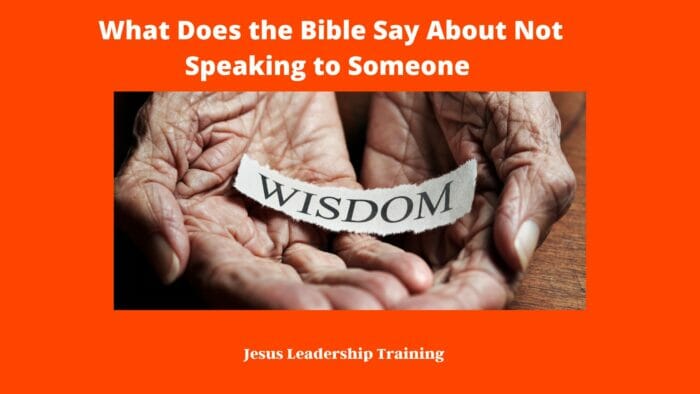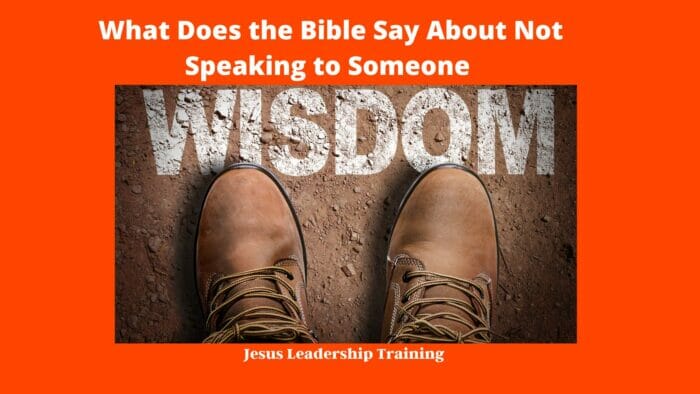What Does the Bible Say About Not Speaking to Someone – The Bible speaks frequently about the importance of communication, especially in relationships. One way in which the Bible speaks to this is by cautioning us against not speaking to someone, which can lead to strife and hurt feelings. In Matthew 18:15, Jesus instructs us to “go and tell him his fault between you and him alone.” This encourages us to speak to someone directly and to be honest and open in our communication.
This can help to resolve conflicts and avoid misunderstandings. Additionally, Proverbs 17:9 tells us that “he who covers an offense promotes love.” This encourages us to overlook someone’s mistakes and to be willing to forgive and forget. Finally, James 1:19 states that “everyone should be quick to listen, slow to speak.” This encourages us to be patient and mindful in our conversations and to listen to what someone has to say before responding. All of these passages demonstrate the importance of communication and the need to speak to someone instead of ignoring them.
Table of Contents
What Does the Bible Say About Not Speaking to Someone
The Bible has a lot to say about communication and the power of words. There are many verses that encourage us to communicate and speak up, but there are also verses that talk about the importance of not speaking. The Bible clearly instructs us to use our words wisely and to not talk too much.

This blog will explore what the Bible says about not speaking and how to use biblical wisdom when choosing not to speak. We will look at the command to speak or not, when to not speak, examples of people not speaking, reasons for not speaking according to the Bible, spiritual gifts from God and not speaking, Bible verses about not speaking, unique facts about the tongue, proverbs on not speaking in the Bible, what does the Bible say about respect and not speaking, and how to use biblical wisdom when not speaking.
The Bible’s Command to Speak or Not Speak
The Bible commands us to use our words wisely and to not speak too much. In Ecclesiastes 5:2 it says “Do not be quick with your mouth, do not be hasty in your heart to utter anything before God. God is in heaven and you are on earth, so let your words be few.” This verse instructs us to be careful with our words, to think before we speak, and to not be too quick to talk.

When to Not Speak
There are times when it is important to not speak. In Proverbs 17:27-28 it says, “A man of knowledge uses words with restraint, and a man of understanding is even-tempered. Even a fool is thought wise if he keeps silent, and discerning if he holds his tongue.” This verse is telling us that there are times when it is wise to not say anything and to allow others to speak.
Bible Snack
Wisdom of Not Speaking
The Bible also speaks about the wisdom of not speaking. In Proverbs 11:12 it says, “A gossip betrays a confidence, but a trustworthy man keeps a secret.” This verse reminds us that it is important to keep confidences and not to gossip. We should think carefully about what we say and who we say it to.
Dangers of Speaking too Much
- Losing Focus: When people talk too much, they often lose focus on the conversation, especially if it’s on a particular topic. This can lead to a lack of understanding of the topic and make it difficult to stay on track.
- Not Allowing Others to Speak: When someone talks too much, they may not give others a chance to contribute to the conversation. This can limit the flow of ideas and create an uncomfortable atmosphere.
- Being Perceived as Arrogant: Talking too much often makes people appear as though they think they are superior to others. This can lead to an impression of arrogance, which can be off-putting for many.
- Boring Others: When someone talks too much, it can quickly become boring for others. People may become impatient or disinterested, which can lead to a lack of respect or appreciation for what is being said.
- Overloading Others With Information: When someone talks too much, they may overload others with information. This can be overwhelming for some, and can make it difficult for them to remember or understand what is being said.
- Making People Uncomfortable: When someone talks too much, it can make people feel uncomfortable. This can lead to people feeling awkward or on edge, which can quickly undermine any progress that has been made in the conversation.
- Creating Misunderstandings: When someone talks too much, they may not always be clear in what they are saying. This can lead to misunderstandings, which can be difficult to resolve.
- Making Poor Decisions: When someone talks too much, they may make decisions that are not well thought out or based on inaccurate information. This can lead to a poor outcome and wasted resources.

Examples of People Not Speaking
The Bible gives us many examples of people not speaking. In the book of Esther, Esther was instructed by Mordecai to not speak of her Jewish heritage. Esther 4:16 says, “Go, gather together all the Jews who are in Susa, and fast for me. Do not eat or drink for three days, night or day. I and my attendants will fast as you do. When this is done, I will go to the king, even though it is against the law. And if I perish, I perish.” Esther chose to not speak and instead to follow the wishes of her uncle.
- Job: Job was a man who chose to remain silent and restrain his speech even when he was suffering great pain and loss. In Job 2:10, we read that he “did not sin with his lips” and in Job 13:5, he said “I will maintain my righteousness and never let go of it”. By remaining silent and keeping his speech in check, Job was able to maintain his integrity and faith in God.
- Daniel: In Daniel 6:10, we read that Daniel “kept silent” and refused to speak out in order to protect himself from the king’s wrath. Daniel’s restraint of his speech was a sign of his faith and trust in God, and it ultimately saved him from a certain death.
- David: In 1 Samuel 21:2-7, we read about David feigning madness in order to restrain his speech and protect himself from Saul’s anger. By restraining his speech and acting mad, David was able to avoid being killed by the king and to find safety.
- Paul: In Acts 21:13-14, we read about Paul restraining his speech in order to protect himself from a mob of angry Jews. Paul chose to remain silent and not to fight back, trusting that God would protect him from the mob. In doing so, Paul showed great faith in God and in His protection.
- Jesus: In Matthew 26:63-64, we read about Jesus restraining his speech in order to protect himself from the Chief Priests and the people. Jesus chose to remain silent, even in the face of false accusations, demonstrating his trust in God and his willingness to follow His will.

Reasons for Not Speaking According to the Bible
The Bible gives us many reasons for not speaking. In Matthew 12:36-37 it says, “But I tell you that everyone will have to give account on the day of judgment for every empty word they have spoken. For by your words you will be acquitted, and by your words you will be condemned.” This verse reminds us that we should use our words wisely and that we will be held accountable for what we say.
- Proverbs 10:19: “When words are many, transgression is not lacking, but whoever restrains his lips is prudent.” This verse encourages us to be mindful of what we say and to think carefully about our words before we speak. It reminds us that when we make careless comments or speak without thinking, we open ourselves up to potential transgressions. By restraining our speech, we can show wisdom and prudence.
- Proverbs 17:27: “Whoever restrains his words has knowledge, and he who has a cool spirit is a man of understanding.” This verse emphasizes the importance of being mindful of what we say and to think before we speak. It encourages us to stay calm and collected when we speak and to think about the consequences of our words before we share them. By restraining our speech, we can display knowledge and understanding.
- James 1:19: “Know this, my beloved brothers: let every person be quick to hear, slow to speak, slow to anger.” This verse encourages us to take a moment before we speak, to listen to what others have to say, and to think through our words before we share them. It encourages us to be slow to anger and to choose our words carefully. By restraining our speech, we can show patience and understanding.
- Proverbs 15:28: “The heart of the righteous ponders how to answer, but the mouth of the wicked pours out evil things.” This verse reminds us of the importance of considering our words carefully before we speak. It encourages us to think through our responses and to choose our words wisely. By restraining our speech, we can show wisdom and righteousness.
- Ephesians 4:29: “Let no corrupting talk come out of your mouths, but only such as is good for building up, as fits the occasion, that it may give grace to those who hear.” This verse encourages us to use our words to build up, rather than to tear down. It reminds us to be mindful of the impact our words can have and to use them to bring grace and kindness to those around us. By restraining our speech, we can show love and respect.
Spiritual Gifts from God
The Bible also speaks about spiritual gifts from God and not speaking. In 1 Corinthians 12:8-10 it says, “To one there is given through the Spirit a message of wisdom, to another a message of knowledge by means of the same Spirit, to another faith by the same Spirit, to another gifts of healing by that one Spirit, to another miraculous powers, to another prophecy, to another distinguishing between spirits, to another speaking in different kinds of tongues, and to still another the interpretation of tongues.”
What Does the Bible Say About Not Speaking
The Bible has a lot to say about not speaking. In Proverbs 17:28 it says, “Even a fool is thought wise if he keeps silent, and discerning if he holds his tongue.” This verse reminds us that we can be wise and discerning even if we choose not to speak. In James 1:19 it says, “My dear brothers and sisters, take note of this: Everyone should be quick to listen, slow to speak and slow to become angry.” This verse is telling us to be slow to speak and to listen more than we talk.
Bible Verses about Not Speaking
There are many Bible verses about not speaking. In Ecclesiastes 5:2 it says, “Do not be quick with your mouth, do not be hasty in your heart to utter anything before God. God is in heaven and you are on earth, so let your words be few.”
In Proverbs 17:27-28 it says, “A man of knowledge uses words with restraint, and a man of understanding is even-tempered. Even a fool is thought wise if he keeps silent, and discerning if he holds his tongue.”
In James 1:19 it says, “My dear brothers and sisters, take note of this: Everyone should be quick to listen, slow to speak and slow to become angry.”
Unique Facts about the Tongue
The Bible has a lot to say about the tongue. In James 3:5-6 it says, “Likewise, the tongue is a small part of the body, but it makes great boasts. Consider what a great forest is set on fire by a small spark. The tongue also is a fire, a world of evil among the parts of the body. It corrupts the whole body, sets the whole course of one’s life on fire, and is itself set on fire by hell.” This verse reminds us of the power of the tongue and how it can be used for good or for evil.
Proverbs on Not Speaking in the Bible
The Bible has many proverbs about not speaking. In Proverbs 10:19 it says, “When words are many, transgression is not lacking, but whoever restrains his lips is prudent.” This verse is telling us that it is important to be careful with our words and to not talk too much. In Proverbs 12:16 it says, “Fools show their annoyance at once, but the prudent overlook an insult.” This verse reminds us that it is wise to overlook an insult and not to respond.
What Does the Bible Say About Respect and Not Speaking?
The Bible speaks a lot about respect and not speaking. In 1 Peter 3:15 it says, “But in your hearts revere Christ as Lord. Always be prepared to give an answer to everyone who asks you to give the reason for the hope that you have. But do this with gentleness and respect.” This verse reminds us to speak with gentleness and respect and to not be quick to respond.
How to Use Biblical Wisdom When Not Speaking
When choosing not to speak, it is important to use biblical wisdom. In Proverbs 16:23 it says, “The heart of the wise makes their speech judicious and adds persuasiveness to their lips.” This verse is telling us to think carefully about what we say and to use wisdom when speaking.
What does the Bible say about distancing yourself from family?
In 1 Corinthians 5:11 it says, “But now I am writing to you that you must not associate with anyone who claims to be a brother or sister but is sexually immoral or greedy, an idolater or slanderer, a drunkard or swindler. Do not even eat with such people.” This verse is telling us to distance ourselves from those who do not follow biblical principles.
- Proverbs 19:13 – “A foolish son is the ruin of his father, and the contentions of a wife are a continual dropping.” This verse encourages us to distance ourselves from family members when their foolishness is causing harm to our lives or those of our loved ones.
- Proverbs 21:9 – “It is better to dwell in a corner of the housetop, than with a brawling woman in a wide house.” This verse emphasizes the importance of distancing ourselves from family members who are causing chaos and contention in the home.
- Matthew 10:37 – “He who loves father or mother more than Me is not worthy of Me. And he who loves son or daughter more than Me is not worthy of Me.” This verse emphasizes the importance of prioritizing our relationship with God above all else, even family.
- Romans 12:15 – “Rejoice with those who rejoice, and weep with those who weep.” This verse encourages us to distance ourselves from family members in times of joy or sorrow so that we can maintain our own emotional health.
- 1 Corinthians 5:11 – “But now I have written to you not to keep company with anyone named a brother, who is sexually immoral, or covetous, or an idolater, or a reviler, or a drunkard, or an extortioner — not even to eat with such a person.” This verse encourages us to distance ourselves from family members who are engaging in immoral behavior.
- 2 Thessalonians 3:14 – “If anyone does not obey our word in this epistle, note that person and do not keep company with him, that he may be ashamed.” This verse encourages us to distance ourselves from family members who are not living according to God’s Word.
- 1 Peter 4:3-4 – “For the time has come for judgment to begin at the house of God; and if it begins with us first, what will be the end of those who do not obey the gospel of God? Now “If it is hard for the righteous to be saved, what will become of the ungodly and the sinner?” This verse encourages us to distance ourselves from family members who are not living according to biblical principles.
What does the Bible say about Abandoning Friends?
In Proverbs 18:24 it says, “A man of many companions may come to ruin, but there is a friend who sticks closer than a brother.” This verse reminds us that we should choose our friends wisely and to not abandon those who are true friends.
- Proverbs 17:17: “A friend loves at all times, and a brother is born for adversity.”
This verse reminds us that true friends are there for us no matter what. They stick with us even in the most difficult times and don’t abandon us when things get tough. - Proverbs 18:24: “A man of many companions may come to ruin, but there is a friend who sticks closer than a brother.”
This verse teaches us that it’s important to have a few close friends instead of many superficial ones. True friends will stick with us through thick and thin, while those with many acquaintances may not be as loyal. - Ecclesiastes 4:9-10: “Two are better than one, because they have a good reward for their toil. For if they fall, one will lift up his fellow. But woe to him who is alone when he falls and has not another to lift him up!”
This verse reminds us that it’s important to have friends who can support us and help us in times of need. It’s much easier to go through life with a trusted companion by our side. - Proverbs 27:17: “Iron sharpens iron, and one man sharpens another.”
This verse reminds us that having friends can help us become better people. We can learn from each other and help each other grow and develop. - Proverbs 17:9: “He who covers an offense seeks love, but he who repeats a matter separates close friends.”
This verse reminds us that it’s important to forgive our friends when they make mistakes. Instead of abandoning them, we should try to work through the issue and restore the friendship. - Proverbs 12:26: “The righteous is a guide to his neighbor, but the way of the wicked leads them astray.”
This verse reminds us that true friends can be a source of wisdom and guidance in our lives. They can help us make the right decisions and stay on the right path.
What does the Bible say about dealing with toxic people?
In Proverbs 16:7 it says, “When a man’s ways are pleasing to the Lord, he makes even his enemies live at peace with him.” This verse is telling us to use wisdom in how we deal with people, even those who are toxic.
- Matthew 7:6 “Do not give what is holy to dogs, nor cast your pearls before swine, lest they trample them under their feet, and turn and tear you in pieces.”
This verse teaches us to be mindful of who we share our deepest secrets, thoughts, and opinions with. It also warns us to be careful when engaging with people who won’t appreciate our thoughts or respect our boundaries.
- Proverbs 16:7 “When a man’s ways are pleasing to the Lord, He makes even his enemies to be at peace with him.”
This verse encourages us to live in a way that is pleasing to God, even if our enemies don’t appreciate it. This gives us peace in knowing that our actions are still pleasing to God, even if the person we are interacting with is not pleased.
- Proverbs 22:24-25 “Make no friendship with an angry man, and with a furious man do not go, lest you learn his ways and set a snare for your soul.”
This verse teaches us to be wary of forming friendships with people who often display anger and rage. It is important to recognize that these individuals may have dangerous habits and behaviors that we should avoid taking on ourselves.
- Ephesians 4:29 “Let no corrupt word proceed out of your mouth, but what is good for necessary edification, that it may impart grace to the hearers.”
This verse encourages us to speak words of grace, kindness, and truth to those around us. It also helps us to recognize the importance of how we communicate with other people, even when we are dealing with toxic people.
- Proverbs 15:1 “A soft answer turns away wrath, but a harsh word stirs up anger.”
This verse teaches us to respond to toxic people with gentleness and kindness, instead of hostility and anger. This can help to de-escalate the situation and possibly restore peace between the parties involved.
How do You Know if God Wants you to Let Someone Go?
In Matthew 7:6 it says, “Do not give dogs what is sacred; do not throw your pearls to pigs. If you do, they may trample them under their feet, and turn and tear you to pieces.” This verse is telling us to use wisdom in who we let into our lives and to not let anyone take advantage of us.
Final Thoughts – What Does the Bible Say About Not Speaking to Someone
The Bible has a lot to say about communication and the power of words. It is important to use our words wisely and to not speak too much. This blog has explored what the Bible says about not speaking and how to use biblical wisdom when choosing not to speak.
We have looked at the command to speak or not speak, when to not speak, examples of people not speaking, reasons for not speaking according to the Bible, spiritual gifts from God and not speaking, Bible verses about not speaking, unique facts about the tongue, proverbs on not speaking in the Bible, what does the Bible say about respect and not speaking, and how to use biblical wisdom when not speaking. We can learn a lot from the Bible about how to use our words wisely and to not speak when it is more beneficial to remain silent.
Greg
Tongue:Bible Verses about the Tongue
15 Unique Bible Facts about the Tongue
Quiz – What Does the Bible Say about the Tongue




